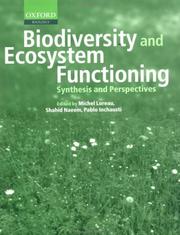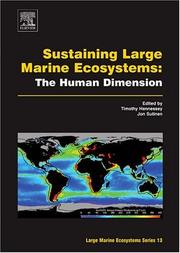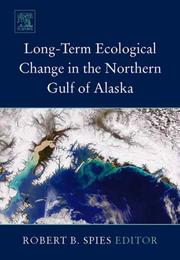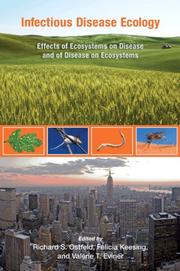| Listing 1 - 10 of 19 | << page >> |
Sort by
|
Book
ISBN: 9535152904 9535105736 Year: 2012 Publisher: IntechOpen
Abstract | Keywords | Export | Availability | Bookmark
 Loading...
Loading...Choose an application
- Reference Manager
- EndNote
- RefWorks (Direct export to RefWorks)
The ecosystems present a great diversity worldwide and use various functionalities according to ecologic regions. In this new context of variability and climatic changes, these ecosystems undergo notable modifications amplified by domestic uses of which it was subjected to. Indeed the ecosystems render diverse services to humanity from their composition and structure but the tolerable levels are unknown. The preservation of these ecosystemic services needs a clear understanding of their complexity. The role of the research is not only to characterise the ecosystems but also to clearly define the tolerable usage levels. Their characterisation proves to be important not only for the local populations that use it but also for the conservation of biodiversity. Hence, the measurement, management and protection of ecosystems need innovative and diverse methods. For all these reasons, the aim of this book is to bring out a general view on the biogeochemical cycles, the ecological imprints, the mathematical models and theories applicable to many situations.
Biodiversity. --- Ecosystem health. --- Ecological health --- Health, Ecological --- Health, Ecosystem --- Ecology --- Biological diversification --- Biological diversity --- Biotic diversity --- Diversification, Biological --- Diversity, Biological --- Biology --- Biocomplexity --- Ecological heterogeneity --- Numbers of species --- Biodiversity
Periodical
Abstract | Keywords | Export | Availability | Bookmark
 Loading...
Loading...Choose an application
- Reference Manager
- EndNote
- RefWorks (Direct export to RefWorks)
emerging contaminants --- environmental chemistry --- human and ecological health --- chemical risk management --- persistent organic pollutants (POPs) --- pharmaceutical and personal care products (PPCPs) --- persistent organic pollutants (pops) --- pharmaceutical and personal care products (ppcps)
Periodical
Abstract | Keywords | Export | Availability | Bookmark
 Loading...
Loading...Choose an application
- Reference Manager
- EndNote
- RefWorks (Direct export to RefWorks)
Peer-reviewed, open-access, rapid online journal on biodiversity and ecosystem risks and opportunities caused by global change and local factors.
Biodiversity --- Ecosystem health --- Environmental risk assessment --- Risk assessment --- Ecological health --- Health, Ecological --- Health, Ecosystem --- Biological diversification --- Biological diversity --- Biotic diversity --- Diversification, Biological --- Diversity, Biological --- Environmental risk assessment. --- Precautionary principle --- Ecology --- Biology --- Biocomplexity --- Ecological heterogeneity --- Numbers of species --- Biodiversité --- Écosystèmes --- Environnement --- Évaluation du risque --- Risques pour la santé --- Évaluation

ISBN: 0198515715 0198515707 9780198515715 9780198515708 Year: 2004 Publisher: Oxford University Press
Abstract | Keywords | Export | Availability | Bookmark
 Loading...
Loading...Choose an application
- Reference Manager
- EndNote
- RefWorks (Direct export to RefWorks)
574.472 --- 574.2 --- 574.2 Organisms and environment. Habitat. Preferendum --- Organisms and environment. Habitat. Preferendum --- 574.472 Biodiversity --- Biodiversity --- Ecosystem health --- Ecosystèmes --- Ecosystèmes --- Ecological health --- Health, Ecological --- Health, Ecosystem --- Ecology --- Biological diversification --- Biological diversity --- Biotic diversity --- Diversification, Biological --- Diversity, Biological --- Biology --- Biocomplexity --- Ecological heterogeneity --- Numbers of species --- General ecology and biosociology --- Biodiversité --- Santé

ISBN: 0444510265 9780444510266 9786610630851 128063085X 0080459706 9780080459707 Year: 2005 Publisher: Amsterdam : Elsevier,
Abstract | Keywords | Export | Availability | Bookmark
 Loading...
Loading...Choose an application
- Reference Manager
- EndNote
- RefWorks (Direct export to RefWorks)
The shift away from the management of individual resources to the broader perspective of ecosystems is no longer confined to academia and think tanks where it first began; the ecosystem paradigm also is beginning to take root in government policy and programs.This volume provides innovative and timely approaches for improving and sustaining socioeconomic benefits from LMEs. The authors describe methodologies and actions for moving forward in halting the downward resource sustainability spiral and advancing toward the recovery of depleted fish stocks, restoration of degraded habitats, and r
504.4 --- 574.5 --- 574.5 Hydrobiology. Aquatic biocoenoses and ecosystems. Food chains --- Hydrobiology. Aquatic biocoenoses and ecosystems. Food chains --- 504.4 Hydrospheric environment --- Hydrospheric environment --- Marine ecology --- Marine resources --- Ecosystem management. --- Ecosystem health --- Ecological health --- Health, Ecological --- Health, Ecosystem --- Ecology --- Biotic communities --- Ecosystems management --- Applied ecology --- Environmental management --- Nature conservation --- Biodiversity conservation --- Biological oceanography --- Marine ecosystems --- Ocean --- Aquatic ecology --- Management. --- Economic aspects. --- Management
Periodical
ISSN: 21537089 Year: 2009 Publisher: Washington, D.C. : U.S. Dept. of Agriculture, Agricultural Research Service
Abstract | Keywords | Export | Availability | Bookmark
 Loading...
Loading...Choose an application
- Reference Manager
- EndNote
- RefWorks (Direct export to RefWorks)
Pesticides --- Agricultural ecology --- Ecosystem health --- Agricultural ecology. --- Ecosystem health. --- Risk mitigation --- Environmental aspects --- Environmental aspects. --- Risk mitigation. --- Pesticide hazard mitigation --- Pesticide risk mitigation --- Risk mitigation of pesticides --- Hazard mitigation --- Pollution prevention --- Pesticide pollution --- Pesticides and the environment --- Ecological health --- Health, Ecological --- Health, Ecosystem --- Ecology --- Agriculture --- Agroecology --- Permaculture --- Economic poisons --- Agricultural chemicals --- Pests --- Poisons --- Control --- Equipment and supplies
Book
ISBN: 9781441995025 9781441995032 9781441995049 Year: 2011 Publisher: New York, N.Y. Springer
Abstract | Keywords | Export | Availability | Bookmark
 Loading...
Loading...Choose an application
- Reference Manager
- EndNote
- RefWorks (Direct export to RefWorks)
General ecology and biosociology --- 504 --- 574.4 --- Environment. Environmental science --- Terrestrial biocoenoses and ecosystems. Biogeocoenoses. Biogeochemical cycles. Food chains --- 574.4 Terrestrial biocoenoses and ecosystems. Biogeocoenoses. Biogeochemical cycles. Food chains --- 504 Environment. Environmental science --- Biogeochemical cycles --- Biological systems --- Ecology --- Ecosystem health --- Ecological health --- Health, Ecological --- Health, Ecosystem --- Balance of nature --- Biology --- Bionomics --- Ecological processes --- Ecological science --- Ecological sciences --- Environment --- Environmental biology --- Oecology --- Environmental sciences --- Population biology --- Biosystems --- Systems, Biological --- System theory --- Systems biology --- Biogeochemistry --- Cycles --- Philosophy --- Biogeochemical cycles. --- Biological systems. --- Ecology. --- Ecosystem health. --- Environmental Sciences and Forestry. Ecology -- Terrestrial Ecology.

ISBN: 1280751916 9786610751914 0080469426 0444529608 9780080469423 9780444529602 Year: 2007 Publisher: Amsterdam : Elsevier,
Abstract | Keywords | Export | Availability | Bookmark
 Loading...
Loading...Choose an application
- Reference Manager
- EndNote
- RefWorks (Direct export to RefWorks)
This comprehensive text is a major synthesis on ecological change in the Gulf of Alaska. It encompasses the structural and annual changes, forces of change, long-ecological changes in the atmosphere and ocean, plankton, fish, birds and mammals, and the effects of the 1989 Exxon Valdez Oil Spill. With 5 major sections, Long-term Ecological Change in the Northern Gulf of Alaska first describes the physical features, the atmosphere and physical oceanography, the annual production cycle, the forage base for higher animals and trophic transfer, and the adaptations for survival in th
Marine ecology --- Ecological disturbances --- Ecosystem health --- Aquatic habitats --- Fish communities --- Marine mammals --- Sea birds --- Oil spills --- Environmental aspects --- Oilspills --- Marine birds --- Ocean birds --- Seabirds --- Communities, Fish --- Ecological health --- Health, Ecological --- Health, Ecosystem --- Disturbance ecology --- Disturbances, Ecological --- Ecological perturbations --- Ecosystem disturbances --- Ecosystem perturbations --- Environmental disturbances --- Environmental perturbations --- Perturbations, Ecological --- Biological oceanography --- Marine ecosystems --- Ocean --- Ecology --- Environmental disasters --- Oil pollution of rivers, harbors, etc. --- Oil pollution of the sea --- Marine animals --- Water birds --- Aquatic mammals --- Animal communities --- Fishes --- Aquatic ecology --- Habitat (Ecology) --- Alaska, Gulf of (Alaska) --- Environmental conditions. --- Gulf of Alaska (Alaska)
Book
ISBN: 9780199547968 9780199547951 0199547955 0199547963 0191563323 0191563315 1282349244 9786612349249 Year: 2010 Publisher: Oxford Oxford University Press
Abstract | Keywords | Export | Availability | Bookmark
 Loading...
Loading...Choose an application
- Reference Manager
- EndNote
- RefWorks (Direct export to RefWorks)
How will biodiversity loss affect ecosystem functioning, ecosystem services, and human well-being?In an age of accelerating biodiversity loss, this timely and critical volume summarizes recent advances in biodiversity-ecosystem functioning research and explores the economics of biodiversity and ecosystem services. The book starts by summarizing the development of the basic science and provides a meta-analysis that quantitatively tests several biodiversity and ecosystem functioning hypotheses. It then describes the natural science foundations of biodiversity and ecosystem functioningresearch in
574 --- Biodiversiteit (bedreigde diersoorten, bedreigde planten) --- Ecologie --- Economie --- 574 General ecology. Biocoenology. Hydrobiology. Biogeography --- General ecology. Biocoenology. Hydrobiology. Biogeography --- Biodiversity --- Ecosystem health --- Human ecology --- Ecology --- Environment, Human --- Human beings --- Human environment --- Ecological engineering --- Human geography --- Nature --- Ecological health --- Health, Ecological --- Health, Ecosystem --- Biological diversification --- Biological diversity --- Biotic diversity --- Diversification, Biological --- Diversity, Biological --- Biology --- Biocomplexity --- Ecological heterogeneity --- Numbers of species --- Economic aspects --- Social aspects --- Effect of environment on --- Effect of human beings on --- Nature protection --- General ecology and biosociology --- Biodiversity. --- Ecosystem health. --- Human ecology. --- Economic aspects. --- Ecological assessment (Biology) --- Monitoring --- Effect of environment on.


ISBN: 128296500X 9786612965005 140083788X 9781400837885 9780691124841 0691124841 9780691124858 069112485X 9781282965003 6612965002 Year: 2010 Publisher: Princeton, NJ
Abstract | Keywords | Export | Availability | Bookmark
 Loading...
Loading...Choose an application
- Reference Manager
- EndNote
- RefWorks (Direct export to RefWorks)
News headlines are forever reporting diseases that take huge tolls on humans, wildlife, domestic animals, and both cultivated and native plants worldwide. These diseases can also completely transform the ecosystems that feed us and provide us with other critical benefits, from flood control to water purification. And yet diseases sometimes serve to maintain the structure and function of the ecosystems on which humans depend. Gathering thirteen essays by forty leading experts who convened at the Cary Conference at the Institute of Ecosystem Studies in 2005, this book develops an integrated framework for understanding where these diseases come from, what ecological factors influence their impacts, and how they in turn influence ecosystem dynamics. It marks the first comprehensive and in-depth exploration of the rich and complex linkages between ecology and disease, and provides conceptual underpinnings to understand and ameliorate epidemics. It also sheds light on the roles that diseases play in ecosystems, bringing vital new insights to landscape management issues in particular. While the ecological context is a key piece of the puzzle, effective control and understanding of diseases requires the interaction of professionals in medicine, epidemiology, veterinary medicine, forestry, agriculture, and ecology. The essential resource on the subject, Infectious Disease Ecology seeks to bridge these fields with an ecological approach that focuses on systems thinking and complex interactions.
Host-Parasite Interactions. --- Environment. --- Ecosystem. --- Environmental Microbiology. --- Ecology. --- Communicable Diseases. --- Communicable diseases in animals --- Host-parasite relationships --- Ecosystem health. --- Balance of nature --- Biology --- Bionomics --- Ecological processes --- Ecological science --- Ecological sciences --- Environment --- Environmental biology --- Oecology --- Environmental sciences --- Population biology --- Environmental microbiology --- Microorganisms --- Ecology --- Microbiology --- Contagion and contagious diseases --- Contagious diseases --- Infectious diseases --- Microbial diseases in human beings --- Zymotic diseases --- Diseases --- Infection --- Epidemics --- Epizootic diseases --- Microbial diseases in animals --- Animals --- Veterinary epidemiology --- Veterinary microbiology --- Host-organism relationships --- Host-pathogen relationships --- Parasite-host relationships --- Pathogen-host relationships --- Relationships, Host-parasite --- Parasitism --- Ecological health --- Health, Ecological --- Health, Ecosystem --- Environmental aspects. --- Wuhan virus. --- Wuhan. --- coronavirus precautions. --- coronavirus symptoms. --- coronavirus usa cases. --- coronavirus. --- mers. --- sars. --- wuhan coronavirus sequence.
| Listing 1 - 10 of 19 | << page >> |
Sort by
|

 Search
Search Feedback
Feedback About UniCat
About UniCat  Help
Help News
News